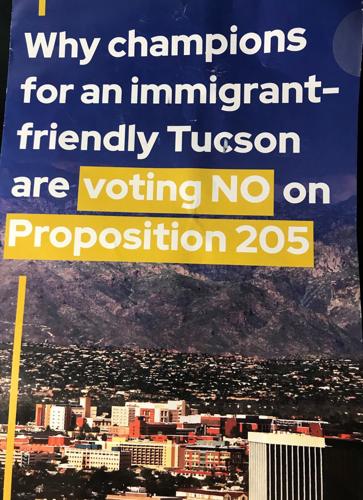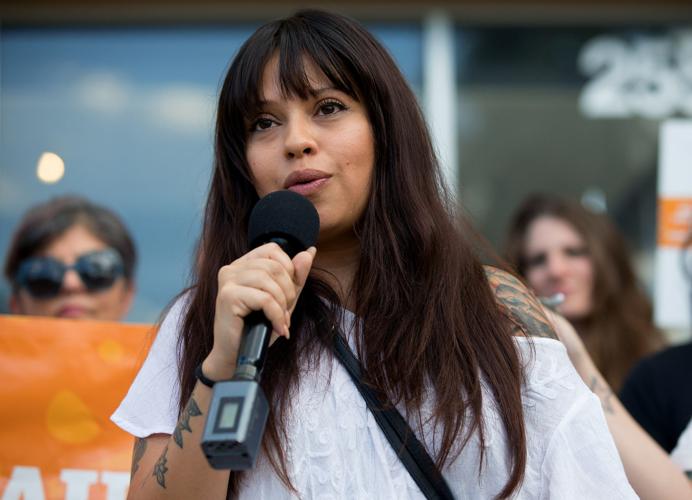The “sanctuary city” initiative is rounding into a comprehensible political battle.
Now we have big money getting involved, and powerful institutions confronting an underdog campaign.
We have competing visions of Tucson — the risk-taking, progressive city versus the risk-averse defenders of the local mainstream.
And in the background lurks the spectre of President Trump, the divider in chief, on this as with so many issues around the country.
What happened to make this race become real last week, so late in the campaign, is that powerful local institutions finally flexed their muscle. The Southern Arizona Leadership Council, Tucson Association of Realtors, Tucson Metropolitan Chamber of Commerce and, surprisingly, Chicanos Por La Causa are pouring in an expected $200,000 to the new No on Prop 205 campaign. Official filings will confirm the various candidates’ and committees’ financial takes this week.
The new money paid for a glossy flyer that went to registered independents and Democrats in Tucson. It featured photos of Mayor Jonathan Rothschild; City Council members Paul Durham, Richard Fimbres and Steve Kozachik; and the chair of the “No” campaign, Larry Lucero, all with quotes about why the sanctuary initiative would be bad for Tucson.
Then, on Tuesday, city government officials flexed their muscles more. City Manager Michael Ortega, Police Chief Chris Magnus and City Attorney Mike Rankin put out a “Q & A” memo on Proposition 205. They presented familiar, disputed arguments about the damage that passing the sanctuary initiative will do to the city.
That, along with previous statements by city officials, convinced the initiative’s supporters to file suit, arguing the public officials are abusing their positions by using public resources to weigh in on the election in a way that could influence the outcome.
The arguments opponents are making against the initiative are, by now, familiar if you’ve been paying attention:
- The initiative could put at risk the city’s $126 million in state-shared revenue if it is successfully challenged in court as violating state law. I am skeptical of this assertion, because the state law allowing legislators to challenge local laws does not include voter initiatives as subject to challenge. But litigation is inevitable and will end up in a Republican-dominated Arizona Supreme Court, which naturally poses a risk.
- The initiative could put $12 million in federal grant funding for Tucson police at risk because the Trump administration could choose to steer grants away from Tucson, as it has tried to do with sanctuary cities. A July court decision shows this is possible, but it’s questionable whether it would happen, I believe, because Tucson’s sanctuary initiative does not prohibit the local jail from handing undocumented inmates to federal authorities. Still, it’s a risk.
- The initiative could put numerous federal-local alliances and programs at risk. This strikes me as more plausible, because while the initiative intends only to prevent immigration agencies from collaborating with Tucson police and attempting to enforce state laws like SB 1070 in Tucson, the language of the initiative refers to any “federal law enforcement agency.”
- By putting money at risk, the initiative threatens the people who depend most on city services, hurting some of the people the initiative is intended to help. Whether you believe this argument, of course, depends on whether you believe money is really at stake.
This last one is the main concern of Chicanos Por La Causa, the social service agency clarified in a written statement.
“Prop. 205, however well intentioned, is susceptible to a myriad of unintended consequences,” the statement says. “This proposal, as drafted, is set to harm more than it will help Arizona communities, including the very individuals the proposed legislation seeks to assist. The 205 initiative will jeopardize state and federal funds, incurring costly and distracting litigation and delay possible avenues for immigration reform at virtually every level.”
Proponents reject this argument, arguing that the measure wouldn’t just prevent racial profiling and make undocumented residents feel secure in calling the police, but would also even potentially be of economic benefit, as people would feel safe coming out of the shadows to work and contribute.
They appear to have a surprising, powerful helper in Donald Trump, as initiative leader Zaira Livier acknowledged to me last week.
“Democrats are absolutely triggered by anything Trump- and immigration-related, and that’s to our advantage,” she said.
Lucero, who is chairing the anti-205 campaign, said the group is aware voters could be motivated to cast a protest vote against Trump and for the initiative.
“They would like to make it about that, and we’re doing all we can to avoid that,” he said. “This is not a referendum on Trump. This is a proposal to affect how Tucson police does its business in Tucson.”
While the anti-campaign is blasting out mailers, the pro-campaign has largely been conducted through door-knocking and phone-calling, but it is going to launch radio and digital ads as well as send out mailers. The campaign has largely been supported by small donors, especially since supporter Alex Kack’s green-shirt guy video went viral.
But now, the pro-205 campaign also has the support of four institutions of its own: The ACLU of Arizona, Planned Parenthood of Arizona, the Pima County Democratic Party and the Pima Area Labor Federation. Livier said she expects to report a total, campaign-long take of about $130,000, but much of that went into earlier stages of the campaign.
The supporters envision a city that isn’t just immigrant-friendly and careful about when officers can call federal immigration officials, but aggressively pushing back on any future efforts to involve local officers in targeting undocumented residents. Supporters often say they want to see Tucson embrace “structural change.”
It’s a vision of a boldly progressive city unafraid to take risks, especially in taking on Trump.
But then there’s the vision of Tucson that, I suspect, marginally more residents have. It’s of a city that, yes, wants to help the downtrodden but also finds no benefit in picking unnecessary fights and feels the city’s politics are drifting too far left.
Just in time for the ballots to arrive in the mail, we finally have two well-formed sides to pick from.







